Steve Cable analyzes Probe’s 2020 Survey, examining beliefs of ‘Nothing in Particulars’ on salvation, biblical worldview, and sexual issues.
We want to examine the Unaffiliated and particularly those who selected Nothing in Particular (NIP) as their religious preference. As noted in the first article of this series{1}, some researchers earlier in this century posited that many of the Nothing in Particulars were actually part of the Christian majority in America and would return to the fold as they aged. However, as shown in that article, this idea has not materialized as the young adults aged. Rather, the percentage of NIPs in each age group has grown as the age group has aged.
In this report, we will see how very different the beliefs of the NIPs are from those taught in the New Testament. We will look at this in three separate areas:
- Salvation through Christ Alone.
- A Biblical Worldview
- Attitudes Concerning Sexual Issues
In these three areas, we will discover that most NIPs disagree with biblical teaching on these topics.
Reasons for Not Believing in Salvation Through Christ Alone
One question asked was “What keeps you from believing that salvation is by faith in Jesus Christ alone?” Particularly for the Unaffiliated, we want to know whether it is a lack of knowledge or some other reason. When asked this question, the respondents could select from the following answers:
- Never gave the question any thought.
- Don’t believe that God would take upon Himself the penalty for my sin.
- Salvation is not a gift, it must be earned.
- I am clearly as good as Christians I know so I should be accepted by God if they are.
- There is no personal, creator God.
- Another answer not listed here.
- Not applicable, I do believe.
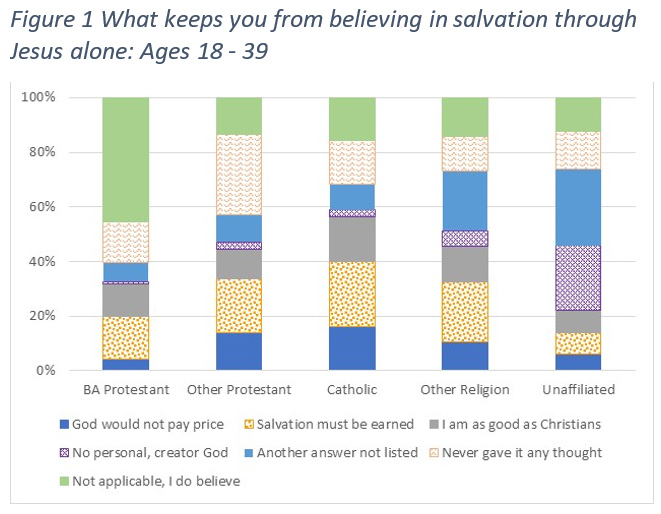
First let’s consider how the various religious groups answered this question as shown in Figure 1. This data has already been discussed in Report #4. But in the current discussion, we want to focus on Other Religion and Unaffiliated. Respondents from Other Religions were most likely to select either “salvation must be earned” or “another answer not listed.” A smaller percentage, just over 10%, selected “I am clearly as good as Christians I know. That answer appeared to be irrelevant to them.
On the other hand, the two largest segments selected by the Unaffiliated were “no personal, creator God” and “another answer not listed.” Both groups had about 15% of their number select “Not applicable, I do believe.”
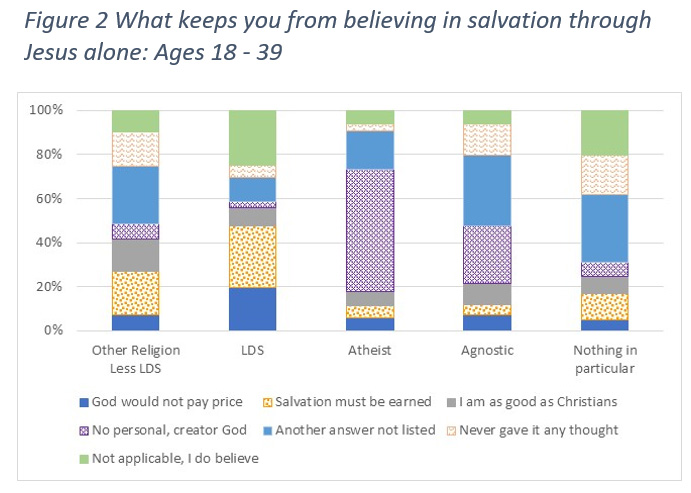 To get a better understanding of what drives these results, we dove further into the makeup of each of these two groups. The results are shown in Figure 2.{2} We divided Other Religions into the Latter Day Saints (Mormons) and all other non-Christian religions. We divided the Unaffiliated into Atheist, Agnostic and Nothing in Particular. As shown, the LDS respondents are much more likely than other religions to select “salvation must be earned,” “I do believe,” and “God would not pay the price.” Almost one quarter of the LDS selected “I do believe” which explains how the Other Religion category showed about 15% with that answer. So we see that a strong majority of LDS people believe that they must do something more than believing in Christ to achieve salvation. At the same time, a significant minority believe in salvation through faith in Christ alone.
To get a better understanding of what drives these results, we dove further into the makeup of each of these two groups. The results are shown in Figure 2.{2} We divided Other Religions into the Latter Day Saints (Mormons) and all other non-Christian religions. We divided the Unaffiliated into Atheist, Agnostic and Nothing in Particular. As shown, the LDS respondents are much more likely than other religions to select “salvation must be earned,” “I do believe,” and “God would not pay the price.” Almost one quarter of the LDS selected “I do believe” which explains how the Other Religion category showed about 15% with that answer. So we see that a strong majority of LDS people believe that they must do something more than believing in Christ to achieve salvation. At the same time, a significant minority believe in salvation through faith in Christ alone.
The Atheist subgroup follows our expectations. A majority (> 55%) don’t believe in Jesus as savior because they do not believe in any God at all. When we add in “another answer not given,” about three quarters of the Atheists are covered.
Moving to Agnostics, we see that a strong majority selected either “no God” or “another answer not given.” Adding in “I never gave it any thought,” we cover about three quarters of the Agnostics.
The Nothing in Particular group (NIPs) has a significantly different range of answers. About one in five say they do believe in salvation through faith in Christ. This number is significantly higher than Atheist and Agnostics, but it still leaves four out of five who say they do not believe. Almost one half of them selected “another answer not given” or “I never gave it any thought.”
So, there are about one fifth of the NIPs who might have a somewhat Christian view of salvation. However, less than 3% of this group claim to be born-again. And of course, four fifths of this group say they do not belih3eve in salvation through faith in Jesus Christ. So, an overwhelming majority of the NIPs clearly are not born-again or evangelical Christians.
NIPS and a Subset of a Biblical Worldview
How do those who claim their religion is “Nothing in particular” stand in accepting a subset of the Basic Biblical Worldview discussed in earlier articles? The subset consists of the following three questions:
- Which of the following descriptions comes closest to what you personally believe to be true about God: God is the all-powerful, all knowing, perfect creator of the universe who rules the world today{3}
- The Bible is totally accurate in all its teachings: Strongly Agree
- If a person is generally good enough or does enough good things for others during their life, they will earn a place in heaven: Disagree Strongly
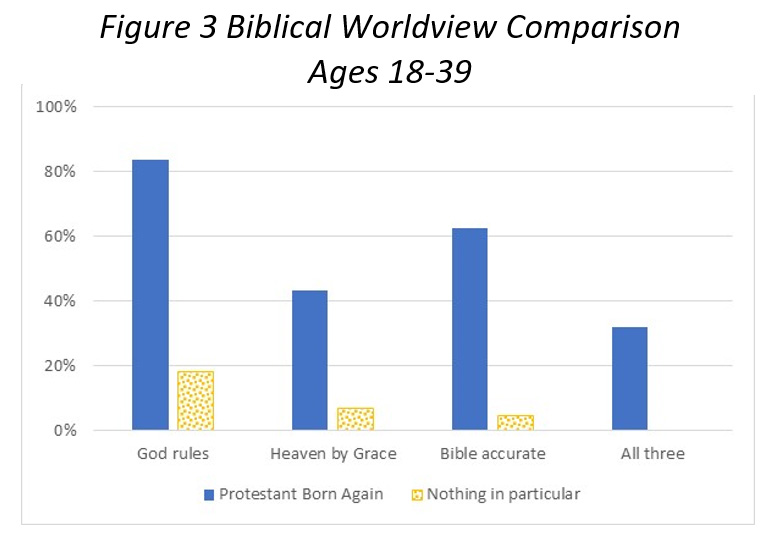 Let’s compare the results for Born-again Protestants and those who claimed to be Nothing in Particular. As shown in Figure 3, for each of the questions those agreeing with a biblical worldview among the Nothing in Particulars is a small fraction of those among Born-again Protestants. When we combine the three questions together, we see one out of three Born-again Protestants vs. no NIPs. Certainly, some of these NIPs came from an evangelical background, but none of them interviewed in our survey ascribe to a basic evangelical worldview as adults. As noted in our first report, one in three orn-again Protestants is a disappointing percentage ascribing to these biblical worldview questions, but it is certainly dramatically better than the Nothing in Particular group.
Let’s compare the results for Born-again Protestants and those who claimed to be Nothing in Particular. As shown in Figure 3, for each of the questions those agreeing with a biblical worldview among the Nothing in Particulars is a small fraction of those among Born-again Protestants. When we combine the three questions together, we see one out of three Born-again Protestants vs. no NIPs. Certainly, some of these NIPs came from an evangelical background, but none of them interviewed in our survey ascribe to a basic evangelical worldview as adults. As noted in our first report, one in three orn-again Protestants is a disappointing percentage ascribing to these biblical worldview questions, but it is certainly dramatically better than the Nothing in Particular group.
NIPs and Biblical Sexual Morality
On another front, we compare views on biblical sexual morality held by Born-again Protestants and Nothing in Particulars. To do this, we will consider three of the questions from our survey as listed below.
- Sex among unmarried people is always a mistake: from Agree Strongly to Disagree Strongly
- Viewing explicit sexual material in a movie, on the internet, or some other source is:
- a. To be avoided
- b. Acceptable if no one is physically or emotionally harmed in them.
- c. A matter of personal choice
- d. Not a problem if you enjoy it
- e. Don’t know
- Living with someone in a sexual relationship before marriage:
- a. Might be helpful but should be entered into with caution.
- b. Just makes sense in today’s cultural environment.
- c. Will have a negative effect on the relationship.
- d. Should be avoided as not our best choice as instructed by God.
For this comparison, we are looking for the following answers:
- Either Agree Strongly or Agree Somewhat
- To be avoided
- Should be avoided as not our best choice as instructed by God
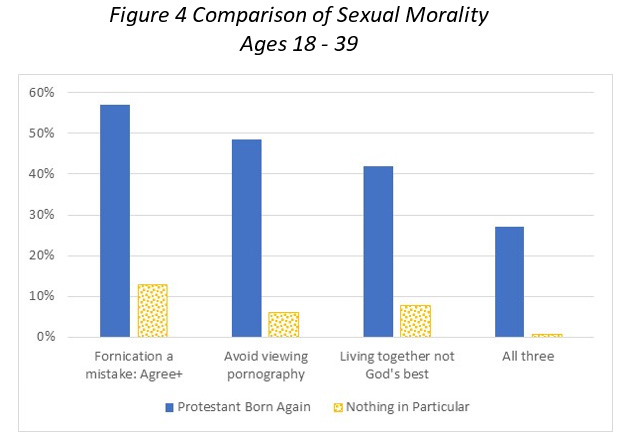 The results from our survey are shown in Figure 4. Once again, we see a large difference between these two groups. Clearly, the NIPs do not ascribe to a biblical view on sexual morality. The majority of Born-again Protestants do not ascribe to those beliefs either, but a significant minority of them do.
The results from our survey are shown in Figure 4. Once again, we see a large difference between these two groups. Clearly, the NIPs do not ascribe to a biblical view on sexual morality. The majority of Born-again Protestants do not ascribe to those beliefs either, but a significant minority of them do.
Summary
As discussed above, we find that the Nothing in Particular group have
- less than one in five who say they are trusting in Christ for their salvation,
- none who accept a simple three question take on a biblical worldview and
- almost none who accept a biblical view on sexuality.
In each of the age groups considered in our surveys, the percentage of respondents selecting a NIP affiliation has grown as the age groups have grown older. There is no indication that any significant number of them are returning to or turning to an Evangelical Christian perspective.
Clearly for the upcoming decade a critical question for the Evangelical church is, How do we reach the Unaffiliated and especially the Nones with the good news of the gospel? Since the vast majority of NIPs do not accept the authority of the Bible, we need to b e prepared to share with them why we can believe the Bible is an accurate communication from the Creator of this universe. In particular, that the biblical account of the death resurrection of Jesus is an accurate historical account. One source to use in this task is our article “The Answer is the Resurrection”{4} which can be found on the Probe website.
Notes
1. Introducing Probe’s New Survey: Religious Views and Practices 2020
2. As we dive down into these subgroups remember that the smaller number of respondents of each type reduce the accuracy as we apply our limited sample to the entire group across the United States. In this case, we surveyed 68 LDS, 178 Other Religions not LDS, 124 Atheist, 167 Agnostic, and 245 Nothing in particular (between 18 and 39 years old).
3. Other answers to select from: God created but is no longer involved with the world today; God refers to the total realization of personal human potential; there are many gods, each with their different power and authority; God represents a state of higher consciousness that a person may reach; there is no such thing as God; and don’t know.
4. The Answer Is the Resurrection: Sharing Your Faith in Christ (probe.org)
© 2022 Probe Ministries
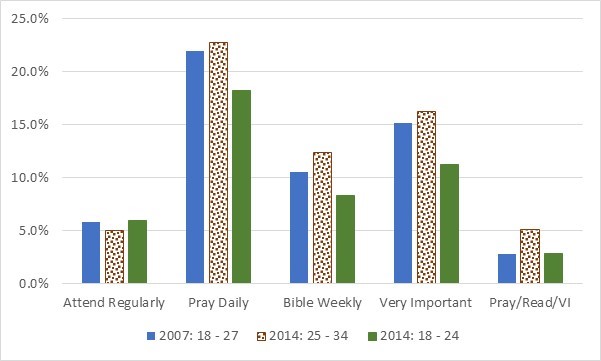 First, let’s consider the religious practices of the Nothing in Particulars. In Figure 1, we see their commitment to some common behaviors of nominal and committed Christians. The actual questions are:
First, let’s consider the religious practices of the Nothing in Particulars. In Figure 1, we see their commitment to some common behaviors of nominal and committed Christians. The actual questions are: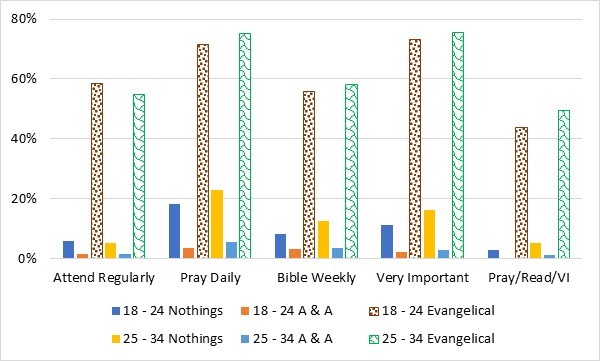 How do these levels relate to the responses from Evangelicals on the one hand and from Atheists and Agnostics on the other hand? Figure 2 gives us the answer to this question.
How do these levels relate to the responses from Evangelicals on the one hand and from Atheists and Agnostics on the other hand? Figure 2 gives us the answer to this question.